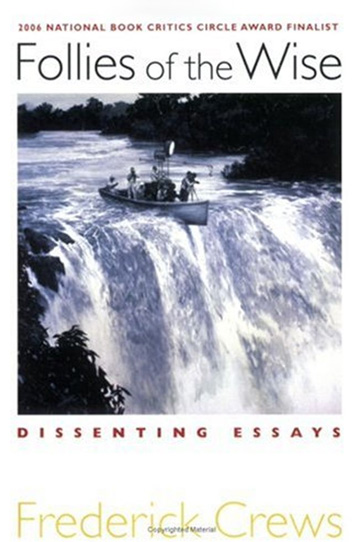
Freud Remains Iconoclastic Professor’s Most Worthy Opponent
May 7, 2006 | San Francisco Chronicle
When Frederick Crews published his review essay “The Unknown Freud” in the New York Review of Books in 1993, he fired the opening shot in what has become known as the “Freud wars,” a ferocious clash over the father of psychoanalysis and his legacy. Crews, a former English professor at UC Berkeley, was by no means the first or the only scholar to attack Freud as a fraud or psychoanalysis as a pseudoscience, but his voice was the loudest and strongest, so his critics responded in angry torrents. The debate raged through the 1990s, traveling through other heady publications such as the (London) Times Literary Supplement and the New Republic to university conferences and even the Library of Congress, which opened a contentious Freud exhibition in 1998. Few public intellectual battles have been bloodier, or more fun to watch.
Crews, who lives in Berkeley, is a rationalist who believes above all in empirical study and has no patience for what he sees as the question-begging conclusions of psychoanalysis. Freud’s central notion that psychological problems are caused by the repression of childhood sexual fantasies (usually a boy’s for his mother or a girl’s for her father, but not to exclude a healthy dollop of homosexual, oral and anal fixations) has never, Crews reminds us, been proved through sound controlled experimentation. And the clinical thesis that psychoanalysts can detect and tease out these buried memories is, Crews argues, fatally contaminated by the therapists’ own suggestive probing.
More plainly: In a psychoanalytic consultation, the analyst will ignore most explanations for the patient’s troubles in favor of the bizarre and the perverted. Through pointed, suggestive questioning, he will uncover (make up?) some seedy memories and describe them to the patient. In addition to recoiling in disgust at the therapist’s own apparent fixation on such prurience, she will reject remembering any such thing. Freud’s advice to therapists at this point is to bludgeon their way through — “to repeat the pressure and represent ourselves as infallible” — and refuse to take no for an answer. The patient will eventually own up to the memories and the diagnosis will be confirmed. Voila. Science.
Crews followed this devastating critique with another provocative essay, “The Revenge of the Repressed,” in 1994. Before Freud decided that patients suffered from repressed childhood memories of sexual fantasies, he had thought that they had repressed memories of actual childhood abuse. This discarded theory was resuscitated in the mid-1980s in the “recovered memory movement,” which led to a string of high-profile child abuse accusations against astonished parents. Crews’ essay deplored this trend — which at the time was in vogue but has since been largely discredited — arguing that it bore the same pseudoscientific features as Freudian psychoanalysis, destroyed unsuspecting families and cultivated an identity politics of survivorship.
Both “The Unknown Freud” and “The Revenge of the Repressed” feature prominently in Crews’ new collection of criticism and essays, “Follies of the Wise.” But a reader interested in these two influential pieces would do better with Crews’ 1995 volume, “The Memory Wars,” which reproduces the heated letter exchange that followed each in the pages of the New York Review. In such fiercely contested waters, the best way to evaluate an advocate is to see him respond to his critics, and Crews does so marvelously. Reading the back-and-forth is like watching a boxer calmly retire a string of challengers and then refuse a chair because he is not even winded.
“Follies of the Wise” branches out to new subjects, although all of the selections are informed by the same hostility to woolly, untested thinking that drives Crews’ writing on Freud. The first half of the volume stays with psychoanalysis and recovered memory, while the remainder is wide-ranging and includes reviews of books discussing Rorschach tests, UFO boosters, 19th century telepathists and theosophists and intelligent designers, and concludes with a sharp if seemingly out of place coda attacking political radicals in academic humanities departments.
If this sounds like an ungovernable smorgasbord, it is. The collection’s eclecticism would cohere better were it not Freud top-heavy — but then that wouldn’t do, because Freud is Crews’ most animating topic. (Taking on abduction theorists isn’t very hard.) But whatever his subject, Crews is always a pleasure to read. He is a brilliant stylist and rhetorician, and his bracing prose reminds us, as did Oliver Wendell Holmes in the law and Freud himself in psychology, that even in technical or abstract matters, effective writing must be crisp, forceful and accessible.
Crews can be quite aggressive, however, and occasionally comes across as mean-spirited, as when he congratulates a scholar for her renunciation of the recovered memory movement only to lash out at her in the next breath for doing it while retaining a feminist perspective. More fundamentally, the best criticism of psychoanalysis (or intelligent design, or any other alleged science) must come from a scientist, not an English professor — a point that Crews himself concedes. Still, we are unlikely to find one who can match these fireballs.